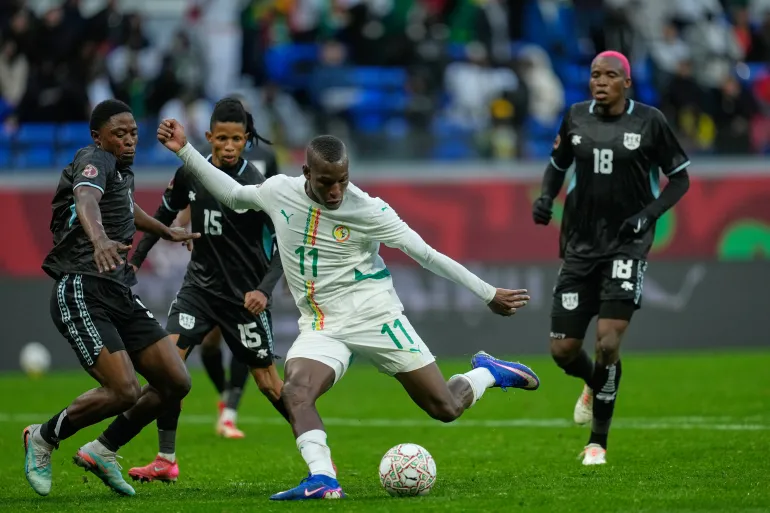Jackson scores two goals as Senegal defeat Botswana at AFCON | Africa Cup of Nations News
Two goals in 18 minutes from forward Nicolas Jackson set the tone for Senegal’s Group D win over Botswana at AFCON 2025.
Published On 23 Dec 2025
Bayern Munich striker Nicolas Jackson grabbed a brace as Senegal eased to a 3-0 victory over Botswana in the Africa Cup of Nations (AFCON) on Tuesday.
Jackson, on loan at the Bundesliga giants from Chelsea, struck either side of half-time in Tangier, with Cherif Ndiaye completing the scoring late on.
Recommended Stories
list of 4 itemsend of list
The victory took Senegal to the top of the table in Group D on goal difference, ahead of the Democratic Republic of the Congo (DRC), who beat Benin 1-0 in Rabat earlier.
It was a predictable outcome to the first match of the tournament for both teams as Senegal are 119 places above Botswana in the world rankings.
Senegal and DRC, both former champions, are expected to fill the top two places and qualify for the round of 16.
Benin and Botswana will view their clash on Saturday as a must-win affair, giving potential victors a chance to fill one of four places in the knockout stage reserved for third-placed teams.
Torrential rain greeted the teams as they walked onto the pitch at the 75,000-seat stadium, the biggest by capacity of the nine being used in Morocco for the tournament.
Senegal had a great chance to take the lead within three minutes in a one-on-one situation, but goalkeeper Goitseone Phoko blocked a shot by Jackson.
Two-time African Player of the Year Sadio Mane, Iliman Ndiaye and Jackson all came close to breaking the deadlock as the Teranga Lions dominated possession, while the Zebras defended in depth.

Botswana waste chance
While Senegal and former Chelsea goalkeeper Edouard Mendy was a mere spectator, Phoko was constantly in action, using his hands, feet and legs to keep the West Africans at bay.
But endless Senegalese pressure finally reaped a reward in 40 minutes when Germany-born Ismail Jakobs and Germany-based Jackson combined to put one of the title favourites ahead.
Jakobs cut in from the left and pulled the ball back to Jackson, who reacted instantly, using his left foot to steer the ball wide of Phoko and into the net.
Botswana, who qualified at the expense of the 2026 World Cup qualifiers Cape Verde, finally threatened to score in added time at the end of the opening half.
But they failed to take advantage of a free kick just outside the area. A weak shot was deflected for a corner that was overhit and went out of play beyond the far post without being touched.
A flowing move from midfield with quick, crisp passing set up Jackson to double the lead after 58 minutes.
When the ball was worked to him in the box, the 24-year-old rounded Mosha Gaolaolwe and tapped home.
Cherif Ndiaye put the cherry on the cake for Senegal as he finished smartly at the end of another fine team move in the 90th minute.
Confident his team were cruising to victory, Senegal coach Pape Thiaw introduced 17-year-old Ibrahim Mbaye from European champions Paris Saint-Germain midway through the second half.
The teenage striker last month became the youngest Senegalese scorer in an international when he netted in an 8-0 rout of Kenya in an AFCON warm-up match.
